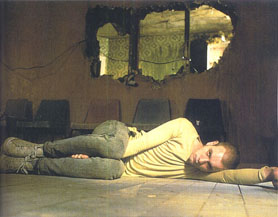Viking Night: Trainspotting
By Bruce Hall
March 9, 2010
There are many reasons that certain films achieve what we call "cult" status, but one of them is that they tend to deliver their message in subversive or controversial ways that don't appeal to everyone. While it's true that most people do not like to work for their entertainment, is it possible that even the most unusual films can have something to offer everyone? When I was in college, a group of friends and I would meet regularly to ponder this very question. Beginning with Erik the Viking, we gathered once a week to watch and discuss a different cult classic, but we decided to keep the Viking theme. Now, I'll be working without a turkey leg or a goblet of mead, but with each installment of Viking Night I still seek to examine the same question: Can a film with such limited appeal still speak to us all?
In order to appreciate Trainspotting the first time you see it, you might benefit from already being a certain type of person. Perhaps you're a rudderless 20-something who considers your very existence to be a nihilistic thumb in the eye of everything that is good and decent. If so, you might be attracted primarily by the film's colorful characters and their youthful defiance. On the other hand, a more discerning critic might welcome the way Trainspotting manages to retain such an even tone despite covering such a grim topic. It juggles bleakness and glibness in almost equal measure but it ably offers an uncompromising view of drug abuse and urban decay without openly passing judgment either matter. And then of course, there is the mainstream moviegoer who will quickly point out that Trainspotting is exactly what I just described - a film about drug abuse and urban decay - things the average person wouldn't care to experience even for 90 minutes! It is probably true that the majority of us tend to view movies (if not all forms of entertainment) as pure escapism, meant to be enjoyed within the cozy boundaries of our relatively predictable and ordinary lives. There's certainly nothing wrong with that; it's difficult for us to expose ourselves to things outside this comfort zone, because we often think there's nothing to be gained by going there. Few of us wish to be challenged by everything we experience, but arbitrarily binding yourself to incuriosity risks depriving you of something more valuable in the long term. We aren't allowed to experience just one side of our own lives, so taking a walk through someone else's existence – warts and all – is occasionally a good way to gain an appreciation of yourself and of everyone around you.
Based on the novel of the same name, Trainspotting is such a journey, chronicling the life and times of a close group of friends in economically depressed Edinburgh, Scotland during the 1980s. The film's narrative is told through the eyes of Mark Renton (Ewan McGregor), an affable but chronically derelict young man living with his parents post adolescence. With jobs scarce and entertainment options even more so, Renton and his closest pals entertain themselves by abusing heroin and milking the pubic aid system – interviewing for jobs often enough to receive a stipend but never quite working hard enough to actually land one. When times are truly tough, the boys fund their painful addiction through petty theft, rarely thinking twice about who they steal from or what they take. They wander aimlessly through the wilderness of young adulthood, adamantly determined not to "choose life". To them, obtaining a job, owning a home, having a family and accepting the basic responsibilities of life are pointless things, with the reason being that death eventually comes to us all whether we are productive members of society or not. Seduced by the convenience of fatalism, Renton and his lads convince themselves that the pursuit of an honest living – not drug abuse – is the fool's errand. Renton alone is able to admit to himself that they live the way they do because it's simpler than finding a job. In the short term, taking drugs simply feels better than punching a clock and in the end, giving up on life is just a whole lot easier than living it.
Continued:
1
2
3
4
|
|
|
|




